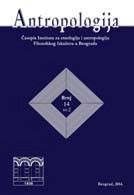INTERDISCIPLINARNI AFINITETI POSTMODERNE ANTROPOLOGIJE, DEO I.Paradigmatski zastoji i opšta mesta interdisciplinarne redukcije
INTERDISCIPLINARY AFFINITIES OF POSTMODERN ANTHROPOLOGY, PART 1: PARADIGMATIC SLOWDOWNS AND COMMON PLACES OF INTERDISCIPLINARY REDUCTION
Author(s): Miloš MilenkovićSubject(s): Structuralism and Post-Structuralism, Cultural Anthropology / Ethnology
Published by: Институт за етнологију и антропологију
Keywords: history of anthropology; postmodern anthropology; ethnographic theory; philosophy of science; realism; perspectivism; context; paradigm; interdisciplinary affinities;
Summary/Abstract: Deep confusion regarding "realism", as one of three basic elements of postmodern crisis in anthropology, has been generated by naive (and therefore popular) attempts to solve methodological problems by using means typical to literary criticism. The problem of confouding "realism" of literary theory with "realism" of philosophy of science is explained as an implication of accidental/ strategic ignoring of the debate on difference between reality of theories and reality of entities by founding authors of postmodern anthropology. Post-positivist philosophy of science (that allegedly promoted "key interdisciplinary affinity" of postmodern anthropology) did not offer a final model of critique of possibility for discovery of criteria of objective knowledge, which was naively hoped for by founding authors of postmodern anthropology. They took on only some of the specific skeptical readings of this shift in focus in the thinkings on science from the interdisciplinary scene. "Revelation" that real scientific practice is less guided by formal rules, and more by context or frame of reference, is an argument that pleases anthropology, but the path that was crossed in philosophy of science so as to get to this revelation did not exclude standard methodological endeavor to set norms and regulate the research. Normative regulatory dimension of general methodology was somehow "slipped by". In the mess of political critique (of the external pressure) and epistemological naivety (of the internal discipline’s heritage), neo-relativist concepts did dominantly take over the quotation scene, but the reduction of the concept of the paradigm to the concept of culture in anthropology (a completely specific disciplinary reading, which will only come back from anthropology to meta-scientific disciplines some years after) created a new reference frame in which anthropological methodological reformers confused critique of realist conception of reality for critique of realist conception of science.
Journal: Antropologija
- Issue Year: 9/2009
- Issue No: 1
- Page Range: 31-52
- Page Count: 22
- Language: Serbian

